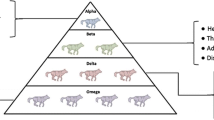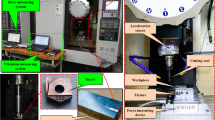Abstract
In this paper, a method to optimize the milling process parameters based on the real-coded self-adaptive genetic algorithm (RAGA) and Grey relational analysis (GRA) is proposed. Experiments have been designed with four input milling process parameters at four different levels. The RAGA coupled with GRA has been applied for solving the proposed optimization problem to achieve the desired machined surface quality characteristics. Simulation experiments give the optimal parametric combination. Furthermore, experiments for the machined surface topography with the initial and optimal combination of milling process parameters are implemented and the results verify the feasibility of the proposed method.
Access this chapter
Tax calculation will be finalised at checkout
Purchases are for personal use only
Similar content being viewed by others
References
Tönshoff, H.K., Arendt, C., Amor, R.B.: Cutting of hardened steel. CIRP Ann. Manufact. Technol. 49(2), 547–566 (2000)
Benardos, P.G., Vosniakos, G.C.: Prediction of surface roughness in CNC face milling using neural networks and taguchi’s design of experiments. Robot. Comput. Integr. Manufact. 18(5), 343–354 (2002)
Zhang, J.Z., Chen, J.C., Kirby, E.D.: Surface roughness optimization in an end-milling operation using the Taguchi design method. J. Mater. Process. Technol. 184(1), 233–239 (2007)
Sabanayagam, A., Kumar, V.A., Raju, S., Kumar, N.S.: Optimization of interconnects for signal integrity using self-adaptation in real-parameter genetic algorithms with simulated binary cross over (SBX). In: 10th International Conference on Electromagnetic Interference & Compatibility, pp. 123–129. IEEE, India (2008)
Gong, C., Xu, C., Wang, J.: An efficient adaptive real coded genetic algorithm to solve the portfolio choice problem under cumulative prospect theory. Comput. Econ. 1–26 (2017). doi:10.1007/s10614-017-9669-5,
Lee, L.H., Fan, Y.: An adaptive real-coded genetic algorithm. Appl. Artif. Intell. 16(6), 457–486 (2002)
Subbaraj, P., Rajnarayanan, P.N.: Optimal reactive power dispatch using self-adaptive real coded genetic algorithm. Electr. Power Syst. Res. 79(2), 374–381 (2009)
Subbaraj, P., Rengaraj, R., Salivahanan, S.: Enhancement of self-adaptive real-coded genetic algorithm using Taguchi method for economic dispatch problem. Appl. Soft Comput. 11(1), 83–92 (2011)
Abbas, H.M., Bayoumi, M.M.: Volterra-system identification using adaptive real-coded genetic algorithm. IEEE Trans. Syst. Man Cybern. Part A Syst. Hum. 36(4), 671–684 (2006)
Oyama, A., Obayashi, S., Nakahashi, K.: Wing design using real-coded adaptive range genetic algorithm. In: 1999 IEEE International Conference on Systems, Man, and Cybernetics, pp. 475–480. IEEE, Japan (1999)
Deng, J.L.: Introduction to Grey system theory. J. Grey Syst. 1(1), 1–24 (1989)
Deng, J.L.: A Course on Grey System Theory. Huazhong University of Science and Technology Press, Wuhan (1990)
Tzeng, C.J., Lin, Y.H., Yang, Y.K., Jeng, M.C.: Optimization of turning operations with multiple performance characteristics using the Taguchi method and Grey relational analysis. J. Mater. Process. Technol. 209(6), 2753–2759 (2009)
Yang, Y.S., Huang, W.: A Grey-fuzzy Taguchi approach for optimizing multi-objective properties of zirconium-containing diamond-like carbon coatings. Expert Syst. Appl. 39(1), 743–750 (2012)
Wang, L., Tang, D.: An improved adaptive genetic algorithm based on hormone modulation mechanism for job-shop scheduling problem. Expert Syst. Appl. 38(6), 7243–7250 (2011)
Acknowledgements
This work is supported by the National Natural Science Foundation of China (Grant No. 51505343) and the Postdoctoral Science Foundation of China (Grant No. 2015M572192).
Author information
Authors and Affiliations
Corresponding author
Editor information
Editors and Affiliations
Rights and permissions
Copyright information
© 2017 Springer International Publishing AG
About this paper
Cite this paper
Zeng, S., Yuan, L. (2017). Optimization of Milling Process Parameters Based on Real Coded Self-adaptive Genetic Algorithm and Grey Relation Analysis. In: Huang, Y., Wu, H., Liu, H., Yin, Z. (eds) Intelligent Robotics and Applications. ICIRA 2017. Lecture Notes in Computer Science(), vol 10464. Springer, Cham. https://doi.org/10.1007/978-3-319-65298-6_77
Download citation
DOI: https://doi.org/10.1007/978-3-319-65298-6_77
Published:
Publisher Name: Springer, Cham
Print ISBN: 978-3-319-65297-9
Online ISBN: 978-3-319-65298-6
eBook Packages: Computer ScienceComputer Science (R0)




